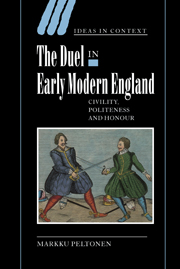Book contents
- Frontmatter
- Contents
- Acknowledgements
- Introduction
- 1 The rise of civil courtesy and the duelling theory in Elizabethan and early Stuart England
- 2 The Jacobean anti-duelling campaign
- 3 Duelling, civility and honour in Restoration and Augustan England
- 4 Anti-duelling campaigns 1660–1720
- 5 Politeness, duelling and honour in Bernard Mandeville
- Epilogue
- Bibliography
- Index
- IDEAS IN CONTEXT
Epilogue
Published online by Cambridge University Press: 22 September 2009
- Frontmatter
- Contents
- Acknowledgements
- Introduction
- 1 The rise of civil courtesy and the duelling theory in Elizabethan and early Stuart England
- 2 The Jacobean anti-duelling campaign
- 3 Duelling, civility and honour in Restoration and Augustan England
- 4 Anti-duelling campaigns 1660–1720
- 5 Politeness, duelling and honour in Bernard Mandeville
- Epilogue
- Bibliography
- Index
- IDEAS IN CONTEXT
Summary
When Richard Hey wrote in 1784 that ‘arguments … in favour of Duelling must be intirely nugatory, even if they can prove that it counteracts the operations of other Vices, or is directly productive of some good Effects’, he was, of course, arguing against Mandeville's defence of duelling. At the same time, however, Hey also questioned the entire tradition of associating civility and duelling closely together. Throughout the early modern period, from William Thomas to Bernard Mandeville, there was a powerful line of argument which not only linked civility with duelling but also insisted that the duel was a particularly efficient means of both maintaining and even enhancing the level of civility and politeness.
But Hey also understood that underlying the whole theory of the duel was a particular interpretation of civility and politeness. According to this interpretation, civility and politeness only bore on one's outward appearance and there was no connection between appearance and one's genuine feelings. On the contrary, as many civility authors had argued, politeness was an efficient means of hiding one's inner feelings. But this had become a bitterly contested notion when equally many theorists had disputed such an interpretation and had argued in its stead that there must always be a link between external politeness and a man's inner self. When Hey declared that a ‘Refinement of Manners … as an external ornament … will spring up as the genuine fruit of Heart’, he was taking the latter side in the dispute.
- Type
- Chapter
- Information
- The Duel in Early Modern EnglandCivility, Politeness and Honour, pp. 303 - 311Publisher: Cambridge University PressPrint publication year: 2003

